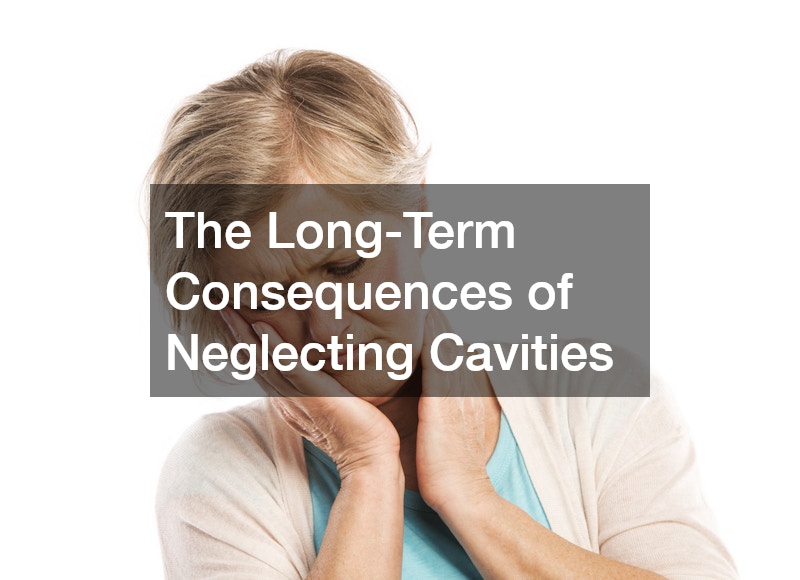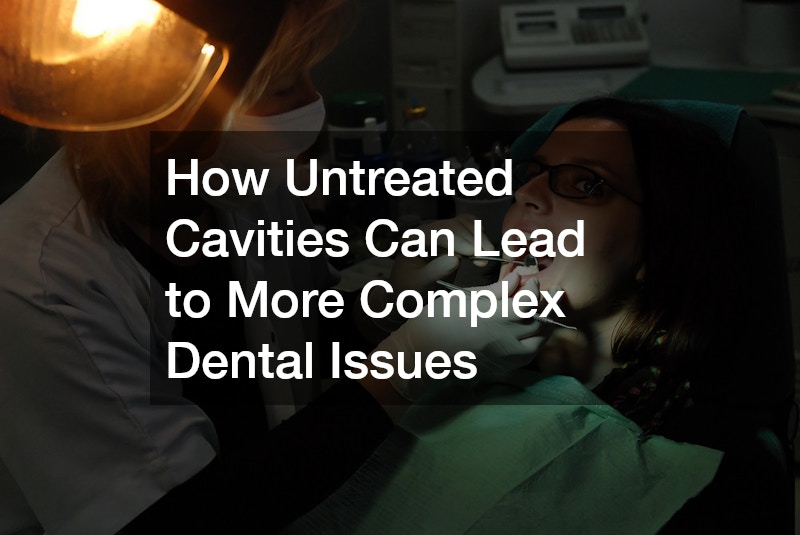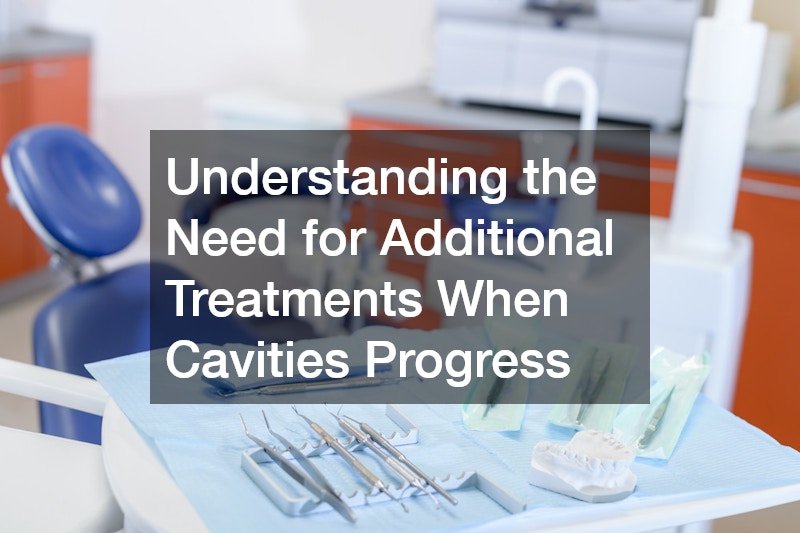
Our oral health is an integral aspect of our overall well-being. While a great deal of attention is paid to routine cleanings and check-ups, understanding the deeper facts about cavities and their consequences often takes a back seat. This article seeks to explore the long-term impacts of cavities and why addressing them promptly is crucial for maintaining a healthy mouth.
Many individuals are unaware of just how critical early intervention in cavity treatment is in preventing more complex dental problems. Local dentists and dental centers often stress the importance of routine visits, but patients might overlook these suggestions due to a lack of understanding about the long-term implications. Ignoring the early signs of tooth decay is not just detrimental to oral health but can also turn into a costly ordeal.
This article delves into each facet of the problem, from the immediate effects of untreated cavities to their potential to complicate orthodontic care and other dental procedures. Understanding these elements can help you make informed decisions about your dental care journey, preventing cavities from impacting your smile aesthetics or requiring more significant interventions such as dental implants.
The Long-Term Consequences of Neglecting Cavities

One of the most significant facts about cavities is that leaving them untreated can result in severe long-term consequences. Cavities can progress deeper into the tooth, reaching the pulp and causing infections that necessitate root canal treatments. This can result in the need for more extensive care, such as a dental crown to restore functionality and aesthetics.
Moreover, neglected cavities can lead to abscesses, which are painful and can affect surrounding tissues. This not only requires immediate dental intervention but can also affect your overall health, as the infection can spread beyond the mouth. Local dentists emphasize that addressing cavities early on is crucial for preventing such problems and maintaining a healthy smile.
As cavities advance, they can also lead to tooth loss, which in turn may require dentures or dental implants. These solutions, while effective, involve more complex procedures and often require additional treatments like gum therapy to ensure a healthy outcome. Overall, understanding the need for timely cavity treatment can save you from extensive and costly reconstructive dentistry.
How Untreated Cavities Can Lead to More Complex Dental Issues

Neglecting cavities can result in the need for more complex dental procedures over time. For instance, a small cavity that could have been filled easily might progress to the point where you require a root canal or even extraction and replacement with a dental implant. This not only increases the complexity but also the cost and recovery associated with dental treatment.
Furthermore, untreated cavities can lead to misalignment issues that might necessitate orthodontic care, including treatments like invisalign treatment. It is crucial to maintain alignment for both functional and cosmetic reasons, and untreated cavities can disrupt this balance. Orthodontic and local cosmetic dentists frequently encounter cases where the lack of initial cavity care has complicated otherwise straightforward procedures.
In addition to alignment concerns, untreated cavities can weaken surrounding teeth, making them more susceptible to damage or decay. This can lead to a cascade of problems where additional teeth require treatment, further complicating your dental care journey. With these facts about cavities in mind, seeking timely dental advice is essential.
Understanding the Need for Additional Treatments When Cavities Progress

Cavities left unchecked often require additional and more invasive treatments as they progress. Once the decay reaches a certain point, simple fillings are no longer sufficient, necessitating procedures such as crowns or even dental implants to fully restore the tooth’s structure. This drives home the importance of addressing cavities promptly to avoid such extensive restorative dentistry.
As cavities enlarge, they can also disrupt the integrity of the gums and bone structure, leading to a need for interventions such as gum therapy. This is especially true in cases where infection has spread and compromised the surrounding tissues. Local dentists are adept at recognizing early warning signs and can recommend appropriate preventive measures.
Besides the necessity for physical repairs, advanced cavities can impact overall oral health, influencing both function and aesthetics. Corrective procedures might consequentially impact other ongoing treatments, such as invisalign treatment, leading to more complicated—and oftentimes more expensive—dental care. These facts about cavities underscore the interdependency of timely treatment and overall oral health management.
The Impact of Cavities on Your Overall Oral Health

The presence of cavities impacts not only the specific tooth but also has broader implications for oral health. Dental plaque, which is a primary culprit in cavity formation, can harbor bacteria that contribute to gum disease and other oral health issues. This underscores the importance of regular check-ups with local dentists to monitor and manage these risks effectively.
Moreover, cavities can contribute to bad breath and tooth sensitivity, affecting your quality of life and confidence. Long-standing cavities can also influence your dietary choices if certain foods cause discomfort, potentially impacting nutritional health. Recognizing the facts about cavities can help you understand their pervasive effects.
Furthermore, untreated cavities can exacerbate underlying conditions like gingivitis or periodontitis, leading to more serious health concerns requiring gum therapy. This reinforces the critical role of regular dental visits in detecting and addressing issues early on. Understanding their holistic impact is essential for comprehensive oral health management.
Why Regular Visits to Local Dentists Are Crucial for Prevention
Routine visits to local dentists play a vital role in preventing cavities and their associated complications. These visits allow dentists to perform examinations and cleanings that can identify early signs of decay, allowing for intervention before significant damage occurs. This proactive approach is key to preventing cavities from advancing to more serious stages.
Regular dental appointments also provide an opportunity to obtain personalized advice on maintaining oral hygiene. This includes guidance on brushing techniques, dietary recommendations, and the importance of fluoride, all of which can significantly reduce the risk of cavities. Local dentists are well-equipped to tailor advice to your individual needs, ensuring optimal oral health.
Moreover, ongoing dental care enables monitoring of any existing dental work, ensuring that treatments remain effective over time. This includes checking the integrity of fillings, crowns, and other restorative measures, and making adjustments as needed. The cumulative benefits of these visits play a substantial role in long-term cavity prevention.
How Cavities Can Complicate Common Dental Procedures
Untreated cavities can greatly complicate common dental procedures, transforming routine care into more complex tasks. For example, placing a dental crown on a tooth with advanced decay often requires additional steps to ensure adequate support for the restoration. This is why treating cavities early is a fundamental aspect of dental care.
Furthermore, cavities can impede procedures such as orthodontic care, where the integrity of teeth is crucial for the effectiveness of treatments like braces or invisalign. In these cases, prolonged treatment times and adjustments may be necessary, increasing both the cost and the duration of care. Understanding the facts about cavities is essential for minimizing these interruptions.
Additionally, untreated cavities can limit options for cosmetic procedures offered by local cosmetic dentists, such as veneers or whitening. If the structural integrity of the tooth is compromised, it may need to be addressed before pursuing cosmetic improvements. This takes time and adds to the complexity of achieving your desired smile.
The Risks of Ignoring Cavities and Their Effect on Oral Hygiene
Ignoring cavities can lead to significant risks for your oral hygiene, where the progression of decay fosters an environment for bacteria proliferation. Such bacteria can cause bad breath, gum disease, and other health issues, disrupting your daily life and hygiene practices. Understanding these risks reiterates the importance of effective cavity management.
Furthermore, cavities left untreated can escalate to a point where they cause the destruction of tooth structure, necessitating restorative procedures like fillings, crowns, or even dental implants. This adds complexity not only to your immediate care but also impacts long-term oral hygiene maintenance. Incorporating the facts about cavities can inform better personal care practices.
The challenge of managing advanced cavities inevitably extends to daily oral hygiene routines. As decay progresses, it becomes more difficult to maintain effective cleaning practices, leading to further complications. Persistently ignoring cavities can thus lead to a vicious cycle of deteriorating oral health, requiring more invasive solutions.
Signs That Ignored Cavities Are Leading to More Serious Problems
There are specific signs that indicate untreated cavities may be causing more severe issues, including increasing tooth sensitivity and pain that persists. These symptoms often point to significant decay or infection, which may require prompt attention from local dentists to prevent progression. Being vigilant about these changes is crucial for avoiding complex treatments.
Another significant sign is the presence of bad breath or a persistent unpleasant taste, often linked to cavities harboring bacteria. Addressing this with dental professionals can uncover the underlying issues and provide both relief and solutions. Facts about cavities reveal how these indicators often precede more severe conditions.
Visible changes in your teeth, such as staining or visible holes, can also signal untreated cavities advancing. These physical manifestations not only affect aesthetics but can also compromise your dental health. Recognizing and responding to these signs can prevent further complications and preserve your oral well-being.
Exploring the Relationship Between Cavities and Tooth Loss
A critical consideration when exploring the facts about cavities is their potential to result in tooth loss if left untreated. As decay progresses, it can compromise the structural integrity of a tooth to the point where restoration options are limited or even infeasible. This often leads to extraction and the need for dental solutions like dentures or dental implants.
Additionally, tooth loss due to cavities can alter the balance and function of your bite, affecting adjacent teeth and gums. This can lead to further dental health challenges and highlight the importance of maintaining the integrity of each tooth. Working with a local cosmetic dentist can help address these concerns effectively.
The emotional and aesthetic impact of tooth loss cannot be understated, with implications for self-esteem and social interactions. Addressing cavities promptly can prevent these outcomes, preserving not just oral health, but also the confidence and quality of life of individuals. Understanding the link between cavities and tooth loss is essential for proactive dental care.
The Importance of Early Intervention in Cavity Treatment
Early intervention is an essential component of effective cavity management. Treating cavities in their initial stages often requires less invasive procedures, preserving the natural tooth structure and avoiding costly treatments. Local dentists emphasize the value of early detection and intervention to ensure optimal dental health outcomes.
By addressing cavities early, patients can often avoid the need for more extensive procedures like root canals, crowns, or dental implants. This not only reduces the potential for discomfort but also minimizes financial burdens. The facts about cavities clearly indicate that early treatment is one of the most effective strategies in preventing further issues.
Moreover, early intervention allows for better planning and personalization of dental care, supporting long-term oral health. Regular visits to dental centers play a crucial role in facilitating early detection, underscoring their importance in the routine management of oral health. Prioritizing prompt treatment is beneficial not just for oral hygiene but overall well-being.
How Neglecting Cavities Can Affect Your Smile Aesthetics
Cavities left untreated can significantly affect the aesthetics of your smile, as decay often leads to visible discoloration and damage. This can detract from the natural beauty of your teeth, impacting personal and social interactions. Understanding these facts about cavities can highlight the importance of timely cosmetic interventions.
Addressing cavities swiftly can prevent the odd dullness or dark spots from marring your smile. This is where the expertise of a local cosmetic dentist can be invaluable, providing options to restore and enhance the health and look of your teeth. From fillings to veneers, there are many solutions available to help maintain a bright and confident smile.
Long-term neglect can also lead to more pronounced changes, such as tooth misalignment or shifting, requiring orthodontic care. These changes can complicate corrective procedures and highlight the need for comprehensive dental care. Maintaining your smile aesthetics involves taking proactive steps against cavities and their potential consequences.
Understanding the Connections Between Cavities and Gums
The connection between cavities and gum health is an important aspect of overall dental wellness. Cavities can harbor bacteria that contribute to gum disease, resulting in inflammation and, in some cases, more serious periodontal conditions. Local dentists often stress the importance of managing both cavities and gum health concurrently to prevent complications.
As decay progresses, it can reach the areas surrounding the base of the teeth, exacerbating gum issues. This can lead to a need for interventions such as gum therapy to restore balance and health. Understanding these interconnections is vital for comprehensive dental care management.
The shared nature of bacterial presence in both cavities and gum issues underscores the importance of broad-spectrum oral hygiene practices. These can prevent the dual progression of cavities and gum disease, reducing the risk of severe procedures like extractions or implants. Recognizing this relationship informs both preventive and active treatment strategies.
How Cavities Can Influence Your Overall Dental Care Journey
Facts about cavities reveal that their presence can significantly shape your overall dental care journey. From preventive routines to the need for more extensive reconstructive dentistry, cavities influence the path of oral healthcare on multiple levels. Managing them effectively is crucial to maintaining long-term oral health.
The progression of cavities can necessitate various treatments, altering your dental care plans. As untreated cavities evolve, they may lead to procedures that impact ongoing treatments, such as orthodontic care or cosmetic enhancements. This underlines the importance of a strategic approach to dental care planning alongside professionals.
Through regular consultations at dental centers, individuals can receive guidance on how to integrate cavity management into their broader oral care strategy. This ensures a concerted effort in maintaining both natural teeth and existing dental work. Understanding how cavities influence your dental care can aid in crafting a balanced and informed approach to oral health.
Cavities are a common dental issue, yet their potential to impact oral health and aesthetics is often underestimated. This article has explored the many ways in which untreated cavities can influence overall dental care, from initiating complex procedures to affecting daily hygiene and smile aesthetics. By understanding these facts about cavities, individuals can take informed actions to protect their oral health.
The role of local dentists and dental centers is critical in providing preventive care and early intervention, minimizing the risks associated with cavities. Regular visits serve as an essential step in maintaining healthy teeth and gums, as well as planning and executing any necessary corrective measures. Empowering individuals with knowledge about cavities leads to better oral health outcomes.
In conclusion, addressing cavities promptly and effectively is a cornerstone of sustainable dental care. By recognizing their impact, consistently employing preventive practices, and engaging in regular dental check-ups, individuals can avoid the pitfalls of untreated cavities. Ensuring that these practices are part of your dental care journey will contribute to lasting oral health and a bright, confident smile.

